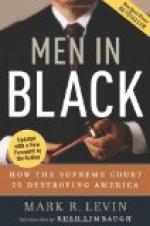The judge throws out a rather mild admonition. “The counsellor must keep to the evidence. You may not refer to matters which are not before the court.” The lawyer says, “Yes, your Honor.” The judge withdraws again into a contemplation of the high cost of living and his diminishing bank balance. The shouting and vociferation grow louder. The jury are long-suffering, but they cannot object. The other lawyer jumps up, and after an insistent effort makes himself heard. “The witness did not say that; you are stating something that is not so. I ask to have the stenographer read the minutes.” The stenographer begins turning over the pages of his stenographic book. The exact testimony of the lady in the car is hard to find. “Heavens,” think the jury, “are we going to have the whole case over again?”
The lawyer who is talking complains, “If my friend is going to keep on with his objections I shall never get through in my fifteen minutes.” The stenographer has not been able to find the exact spot. It is apparently not in the testimony. Then the lawyer objecting says, “I ask your Honor to instruct the jury to disregard the statement of counsel.” The lawyer must have a sarcastic vein of humor. Such an instruction does not seem necessary. The judge says, “I will cover that in my charge, but I must ask the counsel to be careful,” and he looks warningly at the clock.
Finally the hands point to the agreed time. The judge says, “Your time is up, counselor.” “Just one minute more,” says the lawyer and then he goes on for three. The judge raps on his desk. The lawyer winds up his speech in a hurried peroration. “Therefore, gentlemen, with the utmost confidence in your ability as men of experience and affairs, with the sure belief in the justness of my defense, I leave the matter in your hands.”
The plaintiff’s lawyer now takes the floor, the jury shift their feet and glance at the clock. “Gentlemen of the jury,” he begins. He probably leaves out the judge. The plaintiff now having the attack is more direct. It is rather significant of the change in all procedure that the language of all court addresses is becoming more and more simple. The old days when the lawyers delivered homilies of Latin have disappeared. No longer does the lawyer refer to nunc pro tunc, or make facetious jokes in a language the layman and probably the court does not understand. If a lawyer makes too many Latin quotations, the court thinks him affected. He must be simple, direct, and to the point at issue.
His art in presenting his case consists in drawing the picture of the facts so vividly that they will remain in the jurors’ minds. Employing his imagination in forming the concept, he gets it across the rail to the jury by the fine gift of selecting words and incidents. No one, it is said, is ever convinced by argument, but any one can realize a visualized picture of words.
The counsel starts to storm and abuse his opponents and his opponents’ client, and in his wrath also forgetting that persuasion is not accomplished by denunciation. The majority of the jury are rather easy-going, kindly men, who do not care to hear others made too vile. Just as satire is more effective than direct abuse the tolerant juryman prefers to have the other party laughed at than called names.




